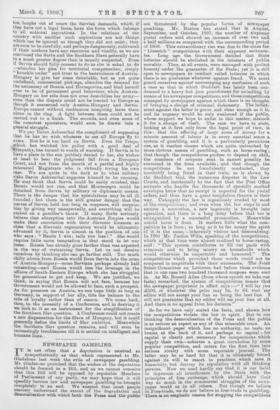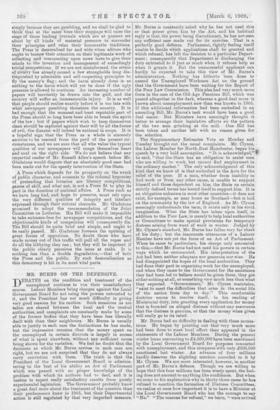NEWSPAPER GAMBLING.
IT is not often that a deputation is received so sympathetically as that which represented to Mr. Gladstone last week the evils of newspaper gambling. Mr. Gladstone promised thet the wishes of the deputation should be framed in a Bill, and as we cannot conceive that this Bill will be opposed by reputable Members of Parliament of any party, we may hope that it will speedily become law and newspaper gambling be brought completely to an end. We suspect that most people scarcely understand the extent of the degradation and demoralisation with which both the Press and the public are threatened by the popular forms of newspaper gambling. Mr. Buxton has stated that in August, September, and October, 1907, the number of sixpenny postal orders sold showed an increase of over two and a half millions as compared with the corresponding period of 1906. This extraordinary rise was due to the craze for " Limerick " competitions with their sixpenny entrance- fee. Long ago the Government decided that State lotteries should be abolished in the interests of public morality. They, at all events, were managed with perfect honesty under the guarantee of the State; yet it is still open to newspapers to conduct veiled lotteries in which there is no guarantee whatever against fraud. We must guard ourselves against encouraging any confusion of such a case as that in which Stoddart has lately been con- demned to a heavy but just punishment for swindling by means of his newspaper competitions, and those competitions managed by newspapers against which there is no thought of bringing a charge of criminal dishonesty. The indict. ment against the latter is grave and clear enough as it is, and its urgency would be only weakened if the public, whose support we hope to enlist in this matter, mistook it for a charge of theft. The case we have to state, looking at it first only from the legal point of view, is this r that the offering of large sums of money for a minute amount of labour is in every essential sense a system of gambling, and it is a particularly pernicious one, as it reaches classes which are quite untouched by more obvious means of gambling, such as horse-racing ; that though the competitions profess to depend on skill, the numbers of coupons sent in cannot possibly be examined in the time available ; and that though the competitions be not fraudulently conducted, they inevitably bring fraud in their train, as is shown by the Stoddart trial, the numerous disputes in the Law Courts, and incidentally by the fact that the Post Office servants who handle the thousands of specially marked envelopes know that no receipt is expected for the Festal orders, and thus have a great temptation thrown in their way. Unhappily the law is ingeniously evaded by most of the competitions; and even when the law steps in and secures a, conviction, a new ingenuity is brought into operation, and there is a long delay before that too is extinguished by a successful prosecution. Meanwhile untold harm is done. It matters little what the com- petition be in form; so long as it be for money the •spirit of it is the same,—inherently vicious and demoralising. In 1901 Mr. Justice Wills, speaking of the competitions, which at that time were almost confined to horse-racing, said: " This system contributes to fill our gaols with criminals and to bring misery on households which would otherwise be respectable and honoured." The competitions which provoked those words could not be compared in magnitude with their successors. The Joint Select Committee on Lotteries had before them evidence that in one case two hundred thousand coupons were sent in. As Mr. Russell Allen (from whose speech we take our facts) remarked, the system of competitions means that the newspaper proprietor in effect says :—" I will lay you £500, or whatever the prize may be, to 6d. that my editor will not accept your line as being the best line. will not guarantee that my editor will see your line at all. And there is no appeal from his decision."
So far we have only stated the facts, and shown how the competitions violate the law in spirit. But to our thinking the demoralisation of the Press and the publics is as serious an aspect as any of this miserable craze. An insignificant paper which has no authority, no taste, no brains at the back of it, and perhaps no capital—for capital is clearly not necessary for competitions which supply their own—achieves a great circulation by some popular competition, and enters for the first time into serious rivalry with some reputable journal. The latter may be so hard hit that it is ultimately forced against its will to resort to practices which save it financially, but destroy its reputation with all thinking persons. Now we need hardly say that it is our habit to deprecate all interference by the State with the principles of free exchange, which should have their way as much in the ccmmercial struggles of the news- paper world as in all others. But though we believe in Free-trade, we do not believe in free-trade iu gambling. There is an emphatic reason for stopping the competitions simply because they are gambling, and we shall be glad to think that at the same time their stoppage will raise the siege of those leading journals which are at present set about by all kinds of material pressure to surrender their principles and relax their honourable traditions. The Press is demoralised far and wide when editors who ought to bestow their attention on their legitimate work of collecting and commenting upon news have to give their Minds to the invention and management of exceedingly trivial competitions. If we are not misinformed, the strain of rivalry has already caused a few strongholds long dis- tinguished by admirable and self-respecting principles to fly the enemy's flag ; and the harm already done is as nothing to the harm which will yet be done if the ugly pressure is allowed to continue. An increasing number of papers will inevitably be drawn into the gulf, and the country will suffer an immeasurable injury. It is as well that people should realise exactly before it is too late with what newspaper gambling threatens the country. It is bad enough that the meanest and least reputable part of the Press should so long have been able to break the spirit of the law ; but if papers which wish to keep themselves clean should be captured against their will by all the forces of evil, the disaster will indeed be national in scope. It is a hopeful sign that the Press as a whole is sincerely anxious to be rescued from the peril of the present cir- cumstances, and we are sure that all who value the typical qualities of our newspapers will range themselves heart and soul on the right side. We do not believe that any impartial reader of Mr. Russell Allen's speech before Mr. Gladstone would dispute that an absolutely 'good case had been made out for the speedy intervention of the State.
. A Press which depends for its prosperity on the wreck of public character, and consents to the colossal hypocrisy of pretending that lotteries are literary competitions, games of skill, and what not, is not a Press fit to play its part in the direction of national affairs. A Press such as we have long had, and hope to preserve, must rely upon the very different qualities of integrity and intellect expressed through their natural channels. Mr. Gladstone promised to adopt the recommendation of the Joint Committee on Lotteries. His Bill will make it impossible to take entrance-fees for newspaper competitions, and the objectionable kinds of competition will consequently die. The Bill should be quite brief and simple, and ought to be easily passed. Mr. Gladstone foresees the uprising of great forces of opposition. No doubt those who have made money out of this traffic will pull all the ropes and do all the lobbying they can ; but they will be impotent if the public clearly perceives the issue at stake. It is nothing less than a double degradation,—that of both the Press and the public. By such demoralisation as this democracy is hit in its most vital parts.















































 Previous page
Previous page